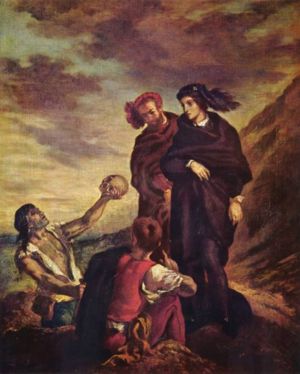Hamlet

Hamlet is a tragic play written by William Shakespeare first published in 1603, and again in an expanded version the following year.[1]
This classic tale depicts the days of a young man named Hamlet in the months following his father's death. Finding it uncomely that his mother, the queen Gertrude, would wed his uncle Claudius so soon after this tragic event, Prince Hamlet of Denmark wrestles with the question of whether his father's death was the result of a natural snake bight, as had been told.
It was in this time that the king's ghost appeared to the city guards. When Hamlet was made aware of this, he spent the night at the post, awaiting his father's soul. His father bid him come and walk. In spite of his comrade's objections, Hamlet followed. After Hamlet declared that he would go no further, the ghost began to speak of his murder. His death was not the natural that had been told, but of poison at the hand of his own brother, who had soon married Hamlet's mother. The kingly figure asked Hamlet to avenge him for his tortured soul in purgatory, but not to harm his queen.
In attempt to exploit his uncle's guilt, Hamlet feigned madness. Polonius, the king's counselor and daughter of Ophelia, who believed Hamlet to love her, conspired to spy on Hamlet in order to demonstrate to the king and queen that it was this love that drove him mad. So he asked of Ophelia to walk about the hall reading just as Hamlet was known to do.
Hamlet, depressed from these weary times and unfortunate news, then debated with himself over the question of life and suicide, in one of the most well-known soliloquies of all time (see To be, or not to be). It was then, after he had finished speaking, that Ophelia entered with her book. Polonius, along with the king and queen, spied on the conversation that took place between the two. Hamlet, in fact, showed no affection for the commoner Ophelia, instead insisting that she join a nunnery.
Determined to show the guilt of his uncle, Hamlet wrote a short play exposing the truth of his father's death, depicting the exact details of the murder. Indeed, Claudius could not help exclaiming his guilt, and Hamlet chased after him to avenge his father. However, when Hamlet caught up with him, he was praying, and Hamlet did not believe it to be justice for Claudius to go straight to heaven since he had just confessed his sins to the Lord.
So Hamlet then left to confront his mother for the wicked deeds she had done. He heard a noise yell out from the curtain, and, believing it to be his uncle, stabbed the cloak figure blindly. He later found that it, in fact, was Polonius. Claudius soon thereafter deported Hamlet to England, supposedly to alleviate his insanity, but in truth, to have him murdered.
In dire grief and despair, Ophelia grew mentally ill and drowned in a river. Her brother, Laertes, returned from a trip to France enraged, and Claudius persuaded him that Hamlet was to blame for his sister's death. So when Hamlet unexpectedly returned, Laertes challenged him to a fencing match. However, Laertes and Claudius plotted to kill Hamlet by means of a sharpened fencing sword dabbled in poison, and, if necessary, by means of a poisoned challis. During the match, queen Gertrude drank of the poisoned wine, thus resulting in her death. Hamlet, however, had already been cut by the poisoned sword. Before he was affected by the venom, however, he cut Laertes with his own sword. In Laertes' last moments of life, he revealed the plot to kill Hamlet. As Hamlet began to succumb to the poison, he avenged his father, then lied down speaking his famous last words, "O, I die, Horatio; the potent poison quite o'er-crows my spirit: I cannot live to hear the news from England; but I do prophesy the election lights on Fortinbras: he has my dying voice; so tell him, with the occurrents, more and less, which have solicited. The rest is silence."
Related topics
External links
References
- ↑ Hamlet; An analysis of the play by Shakespeare (Accessed April 19th, 2007).